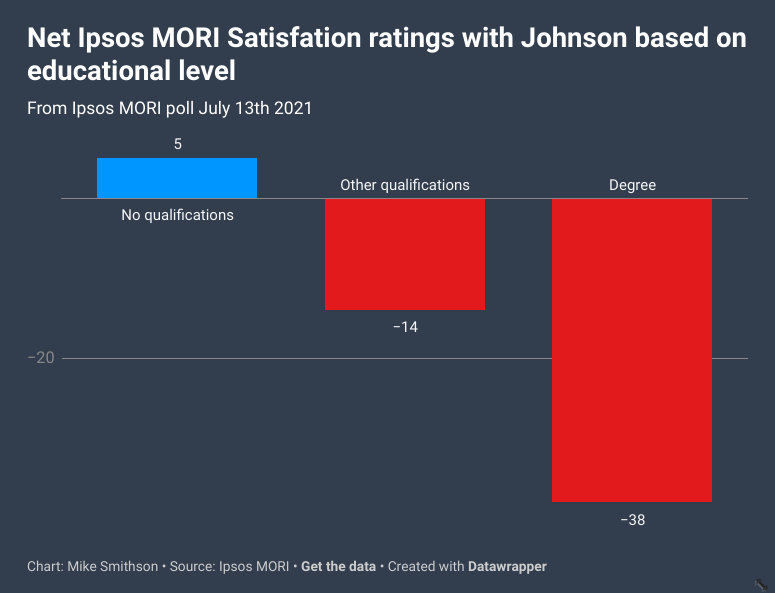The more voters are educated the more likely they are to be negative about Johnson

In all British political polling at the moment the regular Ipsos-MORI political monitor stands out because it is just about the only one that still carries out fieldwork by telephone.
Normally its findings are in broad line with the online pollsters but not so this time. Its voting figures are CON 40%, LAB 31% and the LDs on 13% – the latter being by far the biggest for Davey’s party.
For a poll watcher like me where the firm stands out is in the way it presents its data and the fact that it gives us numbers based on educational level. In the US this is almost always a key indicator but just about only Ipsos in the UK records this.
The chart above shows the firm’s latest Johnson satisfaction ratings base on the educational level which offers us an insight not seen in other surveys of a key dynamic in British politics.
General Elections, of course, are fought in 650 separate constituency contests under first past the post so knowing about the education profile in each seat becomes central. This was one of the reasons I was so confident about tipping the LDs in Chesham and Amersham in last month’s by-election when for much of the campaign the party was rated by punters as a 5% chance.
To check this seat by seat this is a good page to bookmark.
Mike Smithson
UPDATE: These are the markeThis market relates to whether the UK government re-introduces any legally enforceable restrictions on social contact in England related to the spread of coronavirus, following the legal end of restrictions on social contact (currently expected to take place on 19 July 2021). Examples may include, but are not limited to, the mandatory wearing of face masks on public transport or the closure of pubs/nightclubs. For the purposes of this market, restrictions will not include any regulations on international travel or any regulations related to self-isolation or quarantine. For the purposes of this market, ‘re-introduce’ does not require any restrictions to exactly replicate previous restrictions. If the UK government does not end restrictions on social contact in 2021, and thus could not ‘re-introduce’ restrictions, this market will be void. Dates in this market relate to when any restrictions come into force in England, rather than the date on which they are announced. All times and dates in this market are in UK time. Clarification (14 July 2021): This market refers to mandatory England-wide measures introduced by the UK government. Any measures that are introduced locally or by individual companies (e.g. Transport for London only) will not count towards the settlement of this market. Clarification (6 September 2021): If ‘vaccination passports’ are required for entry to nightclubs or other events, this market will be settled for yes, so long as the measure satisfies the other conditions in the market rules, i.e. that it is mandatory, implemented by the UK government, England-wide and legally enforceable. Clarification (12 October 2021): If vaccines become mandatory for people working in care homes at any point in 2021 (https://www.gov.uk/government/publications/vaccination-of-people-working-or-deployed-in-care-homes-operational-guidance/coronavirus-covid-19-vaccination-of-people-working-or-deployed-in-care-homes-operational-guidance) this market will be settled for yes, so long as the measure satisfies the other conditions in the market rules, i.e. that it is mandatory, implemented by the UK government, England-wide and legally enforceable.